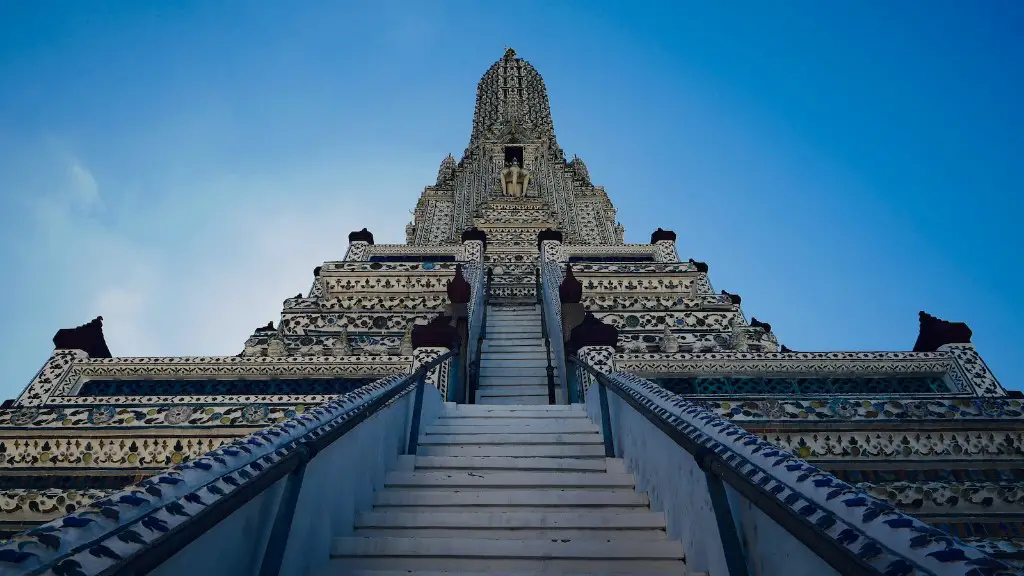Hinduism Explains Multiple Perspectives on God
Hinduism is one of the oldest religious traditions known to man, and has been in continuous practice since at least the second millennium BCE. As such, Hinduism offers a number of differing perspectives regarding the nature of God. While Hinduism is often mistakenly said to be ‘polytheistic’ or the worship of multiple gods, many scholars argue that Hinduism is more accurately defined as ‘monolatristic’, in which God takes multiple forms but is ultimately still one entity. This often manifests itself in the famous Hindu ideas of Brahman, Vasudeva, and Vishnu.
The Upanishads, a collection of ancient spiritual texts, focus on Brahman as the ultimate, all-encompassing reality, while other texts emphasize the existence of the personal gods Vishnu, Shiva and Shakti.
The concept of Brahman, a supreme being that is beyond physical conception yet still exists within the world and in all things, is seen as a way of explaining the unity of existence that stands behind all diversity. In this framework, every form of life is ultimately a reflection of this single source and is intrinsically connected to everything else in the world. This is often expressed through the idea of karma, the concept that any action you take carries with it some cause and effect.
Vishnu, Shiva, and Shakti, are seen as the lords who preside over the many aspects of creation. They are generally represented as individual aspects of Brahman, but are also seen as having distinct personalities and characteristics. Vishnu is the lord of preservation and sustainability, Shiva is the lord of destruction, and Shakti is the goddess of divine power and creation.
The Gita, one of the single most influential pieces of Hindu scripture, proposes a synthesis of these two worldviews and emphasizes that God exists in all things. The famous Bhagavad Gita verse 2.17 says, “God is seated in the hearts of all. From Him come remembrance, knowledge, and forgetfulness.” This idea of God in all things helps to explain the Hindu attitude toward mystical practices and why, for example, yoga is such an integral part of Hindu culture.
Many Hindus also believe that there is a single God that manifests in many forms, allowing a person to connect with Divinity through whichever God they are most comfortable with. This is one of the reasons why there is such a great variety of worship practices within the Hindu community.
No matter which interpretation of these texts one takes, it is clear that Hinduism offers many ways to understand the ultimate nature of God and the relationship between God and human kind. To truly understand the Hindu approach to God, it is necessary to look further and gain a nuanced understanding of the different perspectives presented in Hindu scripture.
Hinduism Defines God as Part of a Larger Cycle
In Hinduism, God is understood to be part of a larger cycle of life and death. Hindus believe that all forms of life, from the most ephemeral to the most permanent, are bound up in an eternal cycle of birth, life, death and rebirth. Understanding of this cycle is often referred to as samsara, or the cycle of existence.
This cycle is often connected with the idea of karma, or the idea that every action we take carries with it some sort of cause and effect. The chains of cause and effect that arise through our actions shape the nature of our future experiences. In Hinduism, the ultimate goal of life is to break free of samsara—to move beyond the cycle of birth, death, and rebirth—and to reach a state of spiritual enlightenment.
The process of enlightenment is seen as a perpetual journey, one that is filled with challenges, but is ultimately a journey toward a greater awareness and understanding of the nature of reality. God plays an integral role in this journey as a mediator between the individual and the spiritual realm.
Ultimately, Hinduism proposes that God is an energy that permeates all things and exists within all of us. The personal aspects of the various gods are mere reflections of the higher spiritual power that unifies creation, guiding us on our personal journeys of spiritual growth and enlightenment.
The idea that God is part of a larger cycle of existence, rather than a static and immutable being, helps to explain why Hinduism is so accepting of multiple perspectives on the ultimate nature of reality. In this way, Hinduism also presents a unique and nuanced understanding of the relationship between Creator and Creation.
Exploring the Relationship Between Creation and Creator
In Hinduism, there is a powerful sense of the interconnectedness of Creation and the Creator. Hindus believe that the universe was created through an act of divine intention, and that all aspects of Creation are a reflection of the will of God.
This is a very different understanding of the relationship between Creator and Creation than that offered by other major world religions. In Christianity, for example, there is a strong emphasis on God as a remote and powerful creator who exists beyond the world and its limits. Hindus, however, often see God as an integral part of the Creation, rather than as a distant force.
As such, Hinduism is strongly focused on personal spiritual growth and enlightenment as the means for connecting with the divine spirit. Hindus also view their own role in the world as vital to maintaining balance and preserving the chain of cause and effect as ordained by God.
In many ways, then, Hinduism offers a unique and complex vision of the relationship between human beings and the divine source. Despite embracing multiple perspectives on the nature of God, Hindus see the divine as intimately connected to the world and the people who inhabit it.
This understanding of the relationship between Creation and Creator offers an invaluable insight into the core goals and motivations of Hinduism. Ultimately, Hinduism seeks to bridge the gap between the physical world and the divine, allowing individuals to converse with the will of God and even become one with it.
Interpreting the Purpose of Hinduism
Hinduism offers a strikingly different interpretation of the purpose of life than that posed by other major world religions. Hinduism does not emphasize an external source of salvation or a heavenly kingdom, but instead, focuses on the internal spiritual journey undertaken by the individual.
This internal journey of transformation is viewed as a way of connecting with the divine source and becoming one with it. It is through this understanding that Hindus come to understand their own place in the world, and how the actions they take in the world can lead to achieving ultimate enlightenment.
At the same time, Hindus see God as an integral part of the Creation, rather than as a distant, separately-existing being. In this way, Hindus understand their relationship with the divine as an intimate one, in which there is an interconnectedness between the spirit of God and the spirit of the individual.
By understanding God as an energy that permeates all things, Hindus are allowed to explore and interpret the nature of ultimate reality in whatever way makes the most sense to them. This freedom of interpretation, along with the emphasis on personal spiritual growth and enlightenment, helps to explain why Hinduism is so unique and inspiring in its approach to God.
The Concept of Brahman in Hinduism
The concept of Brahman is seen as central to Hindu thought, as it is the all-encompassing, ultimate reality that stands behind all diversity and unifies all things. Brahman is often seen as the essential force of existence, and Hindus consider it to be the source of all knowledge, intelligence, and bliss.
The idea of Brahman is often used to explain the unity of existence and the interconnectedness of all things. This is often expressed through the concept of karma, the idea that all actions have consequences to them. All of our actions, good or bad, will come back to us in some form.
Many Hindus also believe that the concept of Brahman is intimately connected with the idea of Atman, the immortal soul that resides within each of us. The Atman connects us to the divine source and allows us to transcend our physical existence and reach enlightenment.
Hinduism also considers Brahman to be the underlying basis for all creation. The Upanishads, a collection of ancient spiritual texts, point to Brahman as the root source from which all things arise. Brahman is the foundation upon which all of existence is built, and Hindus often see the creator as manifesting in all of its forms.
Brahman is thus seen as both an invisible, mystical force that stands behind all of existence, as well as a tangible and accessible presence that exists within the world. Hindus believe that, through connecting to Brahman, they can find ultimate peace, joy, and enlightenment.
Emphasizing the Transformative Power of Hinduism
Hinduism emphasizes a personal spiritual journey of transformation and enlightenment that, in many ways, serves as the ultimate goal of this religion. This is a unique concept among major world religions, and it helps to explain why so many Hindus focus on personal spiritual growth and understanding.
Hindus understand the divine source to be both an energy that permeates all things and a personal God that is accessible through different forms of spiritual practice. Ultimately, Hindus view the path to enlightenment as a never-ending journey, and one that is filled with challenges, but also with a deep sense of connection to the divine source.
Hinduism also offers a unique interpretation of the relationship between Creator and Creation. Hindus view God as an integral part of the Creation, rather than as a distant and static being. This approach to the divine offers an important insight into the goals and motivations behind Hindu thought and practice.
Ultimately, Hinduism offers a number of perspectives on the nature of God, allowing individuals to understand and interpret the divine in ways that make most sense to them. While there are differences among these perspectives, Hindus see them as ultimately united by a single source of ultimate truth and being.

